Immerse yourself in the world of underwater superheroes at National Geographic's annual Sharkfest this July
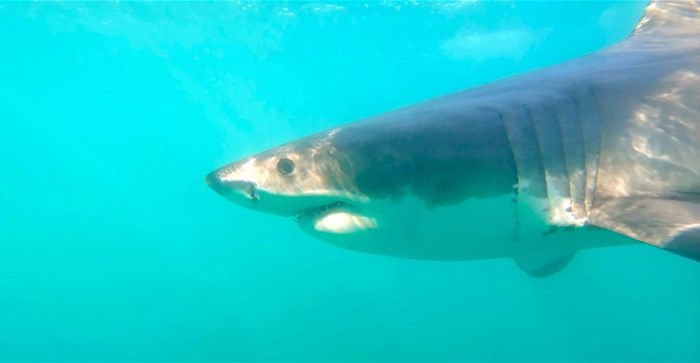
If you’re looking for the most authentic and comprehensive shark-viewing experience ever, look no further than National Geographic’s Sharkfest. Sink your teeth into 72 hours of Sharkfest programming, kicking off on 2 July on National Geographic Wild (DStv 182, Starsat 221). The go-to destinations for science-first shark content will take viewers up close and personal with the ocean’s apex predator.
With cutting-edge technology and industry-leading experts, Sharkfest will entertain viewers with four weeks of explosive, hair-raising and celebratory shark programming that will showcase the captivating science, power, and beauty of these magnificent animals – because one week is simply not enough. With over 22 hours of original programming and over 50 hours of enhanced content, viewers will dive deep into the unpredictable psyche of sharks and their remarkable lives.
This year, Sharkfest starts at home with a special filmed off the coast of South Africa. Around the world, reports of shark-on-shark attacks are on the rise. Now, off the country’s dramatic southern coast, a new hotspot has emerged – in Mossel Bay. Off the coast near Seal Island where great white sharks are known to chase and capture the furry mammals with breach-the-surface aeronautics, scientists have come upon a new theory as to what makes up most of the great white shark’s diet, and it’s not seals. In a ground-breaking investigation, Enrico Gennari and Lacey Williams lead a team of experts into the deep to capture conclusive evidence of sharks eating sharks! Shark Eat Shark premieres on Saturday 1 July at 6.45pm.
Sharkfest will also explore the waters across the US in Cape Cod, Florida, Hawaii, New York, South Carolina and around the world in Australia, the Bahamas, Canada, Indonesia, the UK and more for a global underwater adventure.
Continuing its partnership with Minorities in Shark Sciences (MISS), which encourages diversity and inclusion in shark sciences and inspires the next generation of scientists, National Geographic’s Sharkfest will feature new and familiar experts in this year’s programming. This collaboration lends MISS experts as on-screen talent and allows them to be consultants for the programming and development of the series.
View the trailer for Sharkfest 2023 here:
Expanding beyond the channel, two short films, produced by filmmakers in the Africa Refocussed programme, a collaboration between NEWF (Nature, Environment, Wildlife and Filmmaking project) and the National Geographic Society, will be available on National Geographic Africa’s Youtube channel throughout the month:
Azilali, they do not sleep This film by Faine Loubser depicts the journey through the life of a dark shy shark foetus. The film reveres the sacredness and mystery of the ocean, reminding us that the ocean is always awake and ready to connect with us. Watch this short film here:
Breaking the surface: Diversity in the ocean and marine ecosystem The value of accessibility and knowledge of marine life are explored in in this short film. Featuring shark scientist Sophu Qoma, this film follows her research of Great White Sharks and reveals how the development of skills such as diving enabled her to journey down to the ocean and study this fascinating species. Watch this short film here:
Additional shark focused programming will be available across Disney+ throughout July with plenty of awe-inspiring moments to enjoy and inspire.
National Geographic’s Sharkfest hub, natgeo.com/Sharkfest, will be updated throughout the month to include enhanced content about sharks, including facts, photos and videos, quizzes and more, providing audiences with a better understanding of the ocean’s most misunderstood predator.
No-fin compares to National Geographic’s Sharkfest, the go-to destination for advancement, scientific experts, and incredible shark discoveries. This year’s shark-infested line-up includes:
Return of the white shark
Saturday 1 July at 6pm
Hundreds of great white sharks have recently appeared on the doorstep of one of America’s most popular tourist destinations, hunting in ways never documented before. To understand why the sharks are here and what this means for Cape Cod, a team of scientists are studying this new phenomenon to try to keep people safe. Are the sharks changing the natural ecosystem … or restoring it?
Shark Eat Shark
Saturday 1 July at 6.45pm
Something is amiss in the sharky waters of Mossel Bay, South Africa. Off the coast near Seal Island where great white sharks are known to chase and capture the furry mammals with breach-the-surface aeronautics, scientists have come upon a new theory as to what makes up most of the great white shark’s diet, and it’s not seals.
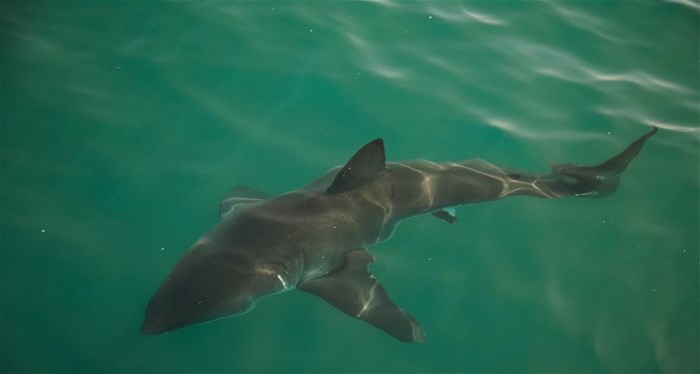
In Shark Eat Shark, shark scientists Enrico Gennari and Lacey Williams embark on a factual voyage with the help of Neil Hammerschlag to solve this predator-prey mystery, by casting a wide net of scientific experiments across the bay. The pair use camera tags and baited remote underwater vehicles (or BRUVs), skin samples and more, to try and capture concrete evidence that sharks are preying on other sharks. With a target area locked in as their playing field for the search, everything starts off promising. But even though the team believes they have every angle of the investigation covered, nature throws them curveball after curveball that threatens to jeopardise everything.
In the end, the team perseveres against all odds and are left with first-ever evidence of their theory that life in the waters off of Mossel Bay are a Shark Eat Shark world.
When sharks attack... and why
(eight-episode series)Sundays 2, 8 and 16 July at 6pm and 7pm
Sundays 23 and 30 July at 6pm
From America’s coastlines to exotic beaches around the world, shark attacks are becoming more unpredictable. Many of these attacks occur suddenly, in large numbers and in unexpected locations – puzzling locals and scientists alike. Experts investigate these mysterious incidents to discover what is affecting some of nature’s most feared fish.
When sharks attack 360
(six-episode series)Sundays 2, 9, 16 July at 8pm
Sunday 23 July at 7pm and 8pm
Sunday 30 July at 7pm
An international team of experts hunts for clues as they investigate why sharks bite humans. They unravel the surprising threads that link these incidents. As the evidence mounts, they analyse data in a cutting-edge VFX shark lab to understand in forensic detail why sharks attack.
Bull shark bandits
Saturday 8 July at 6pm
Shark biologists Dr Johan Gustafson and Dr Mariel Familiar López investigate rising reports of bull sharks stealing from fishermen in Weipa, northern Australia. Could this methodical and radical shift in behaviour provide new evidence of shark intelligence? To find out, the team deploys ground-breaking experiments and technology, including a new diving cage prototype.
Shark below zero
Saturday 8 July at 6.45pm
White sharks have been spotted across Canada as far north as the coast of Newfoundland. After the first suspected white shark attack in Canada for over 150 years, experts Greg Skomal, Heather Bowlby, Megan Winton, and Warren Joyce investigate what drives white shark’s journey to the northernmost limit of their range.
Saved from a shark
Saturday 15 July at 6pm
The scientific community is divided as to whether dolphins or whales will deliberately save a person from a shark attack. But the people who have lived through these terrifying encounters don’t doubt what happened.
Bull shark vs hammerhead
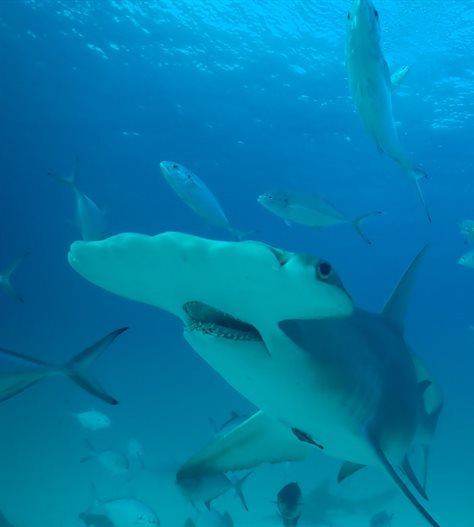
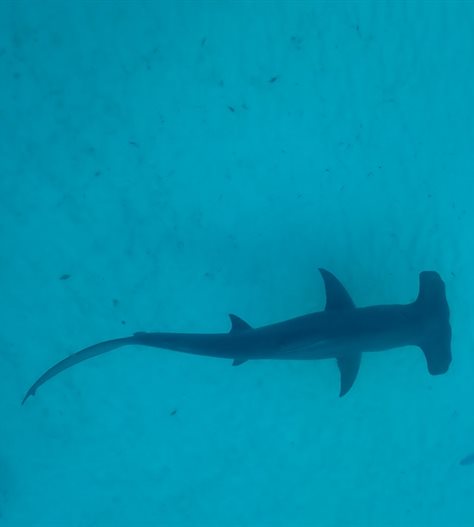
Saturday 15 July at 6.45pm
In Florida, a rare event between top ocean predators was captured on video: bull sharks attacking a great hammerhead. Dr. Heithaus and a team of shark experts launch an investigation pinning one against the other. They put experiments to the test to see what happens when these top predators come head-to-head.
Sharks vs dolphins: Bahamas battleground
Saturday 22 July at 6pm
In the Bahamas, more than 30% of dolphins have shark-bite scars. With a never-before-seen non-toxic gel bite pad and life-sized dolphin decoy, Dr Mike Heithaus and Dr Valeria Paz collect bite impressions from three shark species that might be the predators. Bites from bull sharks, tiger sharks and great hammerheads – up to 4.2 metres long – are compared to scars photographed on dolphins.
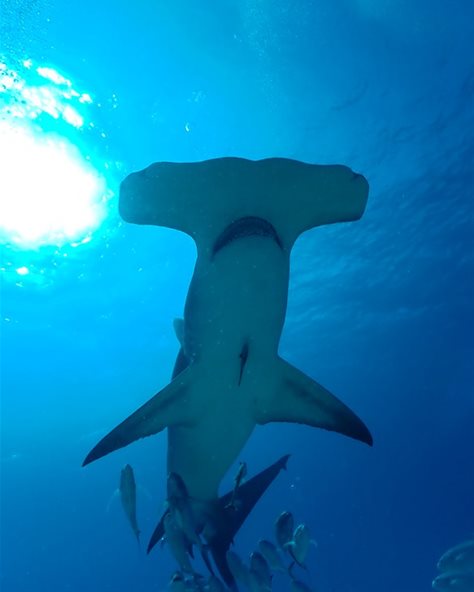
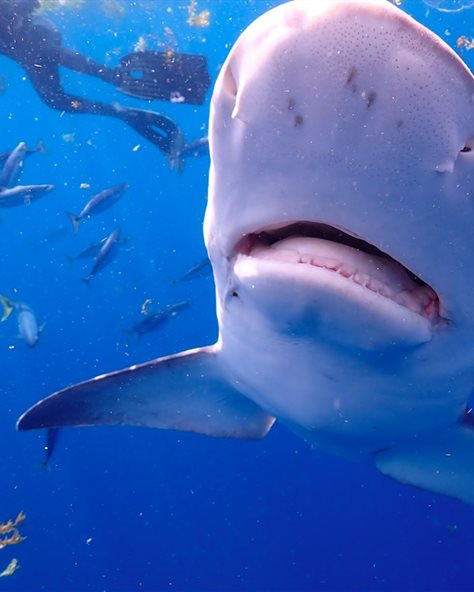
Sharkcano: Hawaii
Saturday 29 July at 6pm
To find out why sharks are drawn to Hawaii’s volcanoes, biologists Dr. Mike Heithaus and Dr. Frances Farabaugh free dive with one of the most dangerous sharks: the tiger shark.
- Nat Geo launches David Blaine: Do Not Attempt in South Africa 24 Mar 2025
- David Blaine pushes the limits in new National Geographic series David Blaine: Do Not Attempt 13 Mar 2025
- Disney announces 5th Descendants movie in production 28 Feb 2025
- Nat Geo dishes up No taste like home with Antoni Porowski this February 18 Feb 2025
- Celebrate the real Lion King this December 5 Dec 2024
The Walt Disney Company AfricaThe Walt Disney Company has been in Europe, Middle East and Africa (EMEA) for over 80 years and employs thousands across the region. |